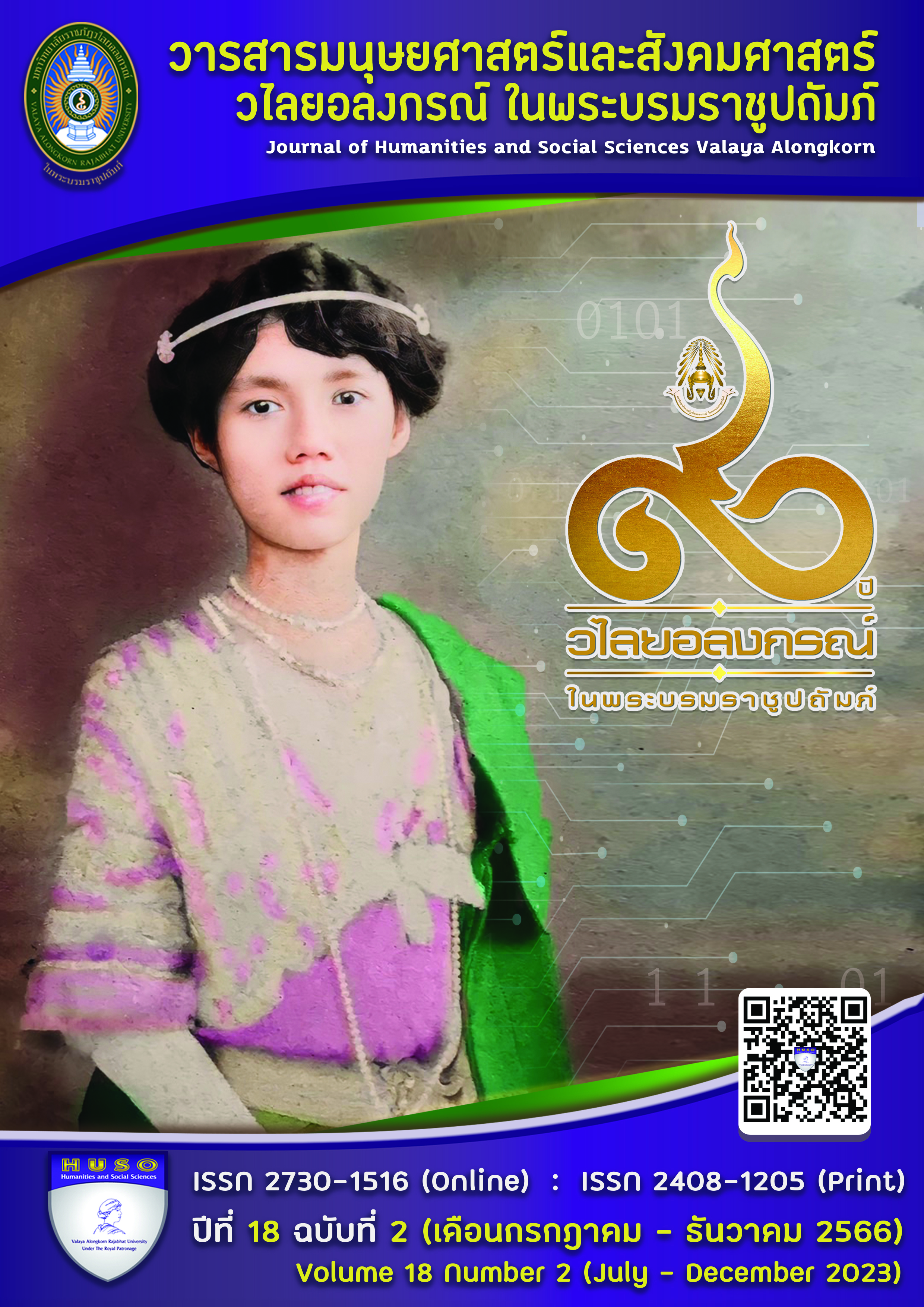THE BUILDING AND MAINTAINING THE POLITICAL SUPPORT BASE FOUNDATION IN ANG THONG PROVINCE
Main Article Content
Abstract
The objectives of this mixed methods study were to investigate: (1) the level of social support, attitudes towards death, and death preparation behavior; (2) the relationship between social support, death attitude, and death preparation behavior; and (3) viewpoints of social support, death attitude and death preparation behavior among Kasetsart University students. The study sample comprised 140 undergraduate students at Kasetsart University Bangkhen Campus, Academic Year 2022. Of these, 120 participants were recruited by quota sampling for quantitative study, and data were collected using questionnaires. The quantitative data were analyzed using frequency, percentage, mean, standard deviation, and Pearson's product-moment correlation coefficient. Next, 20 volunteer participants were selected by purposive sampling for in-depth interviews. The qualitative data collected were analyzed using content analysis. The results indicate a high level of students’ social support (M= 3.68, SD=0.55), and moderate levels of attitude toward death and death preparation behavior (M= 3.17, SD=0.73 and M=2.83, SD=0.52, respectively). Moreover, death attitude had a moderate positive correlation with death preparation behavior (r=.53, p<.05), while there was no relationship between social support and death preparation behavior, nor between social support and death attitude. Furthermore, the in-depth interview on social support revealed that social support helps students to improve their death preparation behavior, and the most important sources of social support are family and friends. Students hold different ideas about life after death and contemplation of death, but most students perceive death as a natural thing that happens in life. Most participants have a positive perception toward death preparation behavior and believe that if they were prepared for death, they would live a happier life. However, most of them have not yet engaged in death preparation.
Article Details

This work is licensed under a Creative Commons Attribution-NonCommercial-NoDerivatives 4.0 International License.
ลิขสิทธิ์บทความวิจัยที่ได้รับการตีพิมพ์เผยแพร่ในวารสารมนุษยศาสตร์และสังคมศาสตร์ วไลยอลงกรณ์ ในพระบรมราชูปถัมภ์ ถือเป็นกรรมสิทธิ์ของคณะมนุษยศาสตร์และสังคมศาสตร์ มหาวิทยาลัยราชภัฏวไลยอลงกรณ์ ในพระบรมราชูปถัมภ์ ห้ามนำข้อความทั้งหมดหรือบางส่วนไปพิมพ์ซ้ำ เว้นแต่จะได้รับอนุญาตจากมหาวิทยาลัยเป็นลายลักษณ์อักษร
ความรับผิดชอบ เนื้อหาต้นฉบับที่ปรากฏในวารสารมนุษยศาสตร์และสังคมศาสตร์ วไลยอลงกรณ์ ในพระบรมราชูปถัมภ์ เป็นความรับผิดชอบของผู้นิพนธ์บทความหรือผู้เขียนเอง ทั้งนี้ไม่รวมความผิดพลาดอันเกิดจากเทคนิคการพิมพ์
References
เจนจิรา แพนพันธุ์อ้วน. (2564). การปรับตัวของพรรคชาติไทยพัฒนาหลังการสูญเสีย นายบรรหาร ศิลปอาชา กรณีศึกษา: จังหวัดสุพรรณบุรี [วิทยานิพนธ์รัฐศาสตรมหาบัณฑิต ไม่ได้ตีพิมพ์] มหาวิทยาลัยบูรพา. ThaiLis.
ปรีชา คุวินทรพันธุ์. (2543). ความสัมพันธ์ทางเครือญาติ เพื่อนและผู้อุปถัมภ์กับผู้รับอุปถัมภ์ในสังคมที่ซับซ้อน
ในระบบอุปถัมภ์ พิมพ์ครั้งที่ 2). สำนักพิมพ์แห่งจุฬาลงกรณ์มหาวิทยาลัย.
พัฒนชัย สีนอเพีย. (2552). ฐานอำนาจทางการเมืองในจังหวัดอ่างทองของนายสมศักดิ์ ปริศนานันทกุล
[วิทยานิพนธ์รัฐศาสตร์มหาบัณฑิต ไม่ได้ตีพิมพ์]. มหาวิทยาลัยสุโขทัยธรรมาธิราช. ThaiLis. https://shorturl.asia/MamQ0
เยาวลักษณ์ ชาวบ้านโพธิ์. (2563). พรรคชาติไทยกับการสร้างอำนาจทางการเมือง. วารสารสันติศึกษา
ปริทรรศน์ มจร, 8(2), 417-430.
ลิขิต ธีรเวคิน. (2542). ระบบอุปถัมภ์และการเมืองไทย. มหาวิทยาลัยธรรมศาสตร์.
วรรณี บุญประเสริฐ. (2556) จุดก่อกำเนิด การดำรงคงอยู่ และการพัฒนาเป็นสถาบันของพรรคชาติไทย.
[วิทยานิพนธ์ปรัชญาดุษฎีบัณฑิต ไม่ได้ตีพิมพ์]. มหาวิทยาลัยเกริก.
สินธุชัย ศุกรเสพย์. (2539). บทบาทของเจ้าพ่อในการเมืองไทย พ.ศ. 2517-2535. [วิทยานิพนธ์ศิลปะศาสตร
มหาบัณฑิต ไม่ได้ตีพิมพ์]. จุฬาลงกรณ์มหาวิทยาลัย. ThaiLis. https://shorturl.asia/aVFAx.

